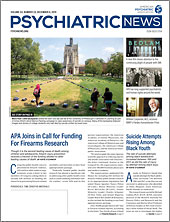Last month two federal courts voided the Trump administration’s “conscience rule,” which would have allowed health care professionals to refuse to participate in abortion, transgender health care, or any other service to which they object for religious or moral reasons.
The rule was issued in May by the Department of Health and Human Services (HHS) and covered health care workers and facilities that receive federal funding. The rule, which had been set to take effect on November 22, purported to implement a patchwork of more than two dozen statutory provisions recognizing the rights of conscience-based objectors in health care.
“The judges in these cases made the right decision not only legally but also with regard to patients’ rights,” said APA CEO and Medical Director Saul Levin, M.D., M.P.A. “This kind of government interference endangers our patients’ health by limiting, and sometimes altogether eliminating, access to medically accurate information and to the full range of health care services they need.”
“We ought not to have religious beliefs interfere with the provision of legal health care,” Nada Stotland, M.D., M.P.H., former APA president and an expert in reproductive psychiatry, told Psychiatric News. “This rule would have allowed any health care worker to halt medical treatment, from your local pharmacist to the appointment scheduling staff. If you need surgery and the anaesthesiologist won’t give you anaesthesia, you can’t have the surgery.”
U.S. District Judge Paul Engelmayer wrote in his ruling from New York that HHS’s central claim of a significant increase in complaints related to conscience is “flatly untrue. This alone makes the agency’s decision to promulgate the rule arbitrary and capricious.” The ruling involved a lawsuit brought by the state of New York, which was joined by 18 states, the District of Columbia, and reproductive health care advocates.
Engelmayer’s decision invalidates Trump’s rule nationwide, but two days later U.S. District Judge Stanley Bastain echoed the decision, granting a summary judgment in a lawsuit brought by Washington state, among others. Another lawsuit is pending against the rule in California, filed in part by LGBTQ advocates Lamda Legal and the County of Santa Clara.
If enacted, the rule would have been a blow to LGBTQ patients, who already face discrimination in health care. In fact, nearly 1 in 5 transgender or gender nonconforming individuals report being refused health care outright by providers, according to a report issued by the National LGBTQ Task Force.
Jack Drescher, M.D., who served on the DSM-5 Work Group on Sexual and Gender Identity Disorders and is a clinical professor of psychiatry at Columbia University, expressed concern that the court rulings may not survive an appeal to the Supreme Court.
“Allowing individuals to use judgmental religious beliefs as a rationalization for denying needed health care to patients is a slippery slope that would be extremely disruptive to our current health care system,” said Drescher.
Stotland said that a variety of options for reproductive care is assumed to exist when a health care professional is unwilling to participate. “The reality is that patients who are refused care often cannot get prescribed, medically necessary interventions, either because of the sparsity of providers in a geographic region or network or due to patients’ lack of time or transportation to shop around for care. That is unconscionable.
“The incorrect assumption underlying these laws is that only those who don’t want to participate in abortion, sterilization, or contraceptive care have a conscience,” Stotland continued. “The women seeking these services have a conscience as well, and it is their conscience that drives them to seek reproductive health care. They want to have children when they can provide proper care for them, and not when they cannot.”
‘Conscience Provisions’ Remain
While health care advocates hail the ruling as a major victory, it does not invalidate some 30 other existing federal statutory provisions on the books known collectively as the “conscience provisions.” These are more limited in scope than the 2019 rule but also aim to accommodate religious and moral objections to providing certain health care services among those receiving federal funding.
In a statement following the court ruling, the HHS Office for Civil Rights wrote that it “can and will continue to receive and investigate complaints” under these laws “to the extent not prohibited by court order.” ■
New York v. HHS is posted
here. The HHS rule, “Protecting Statutory Conscience Rights in Health Care; Delegations of Authority,” is posted
here.

